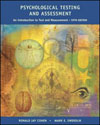 |
1 |  | 
What types of modification are necessary to conduct reliable and valid psychological assessments of children and adults with different types of disabilities (e.g., vision, hearing, deaf/blind, motor, cognitive)? |
|  | |
 |
 |
2 |  | 
Why not use only intelligence tests in the assessment of mental retardation? |
|  | |
 |
 |
3 |  | 
Why have hearing-impaired and deaf children often been mistakenly diagnosed as mentally retarded or emotionally disturbed in the past? Why is there a need for a complete evaluation including different tests, interviews, observations, history taking, and review of all relevant records? |
|  | |
 |
 |
4 |  | 
Name three different standardized testing instruments and discuss how each can be modified for individuals with motor disabilities. Be sure to take into consideration the problem of deviating from the standardized procedures and its implications for using the norms. |
|  | |
 |
 |
5 |  | 
Discuss the issue of personality assessment of the hearing impaired. What special challenges does this present for the examiner? What types of measures are typically used, and what are their advantages and limitations? Compare and contrast these challenges when assessing individuals with cognitive, visual, or motor disabilities. |
|  | |
 |
 |
6 |  | 
How does the examiner answer the question of the relevancy of the norms when comparing an examinee with a disability with nondisabled peers or with those who have disabling conditions? |
|  | |
 |
 |
7 |  | 
Discuss the relationship between quality of life issues and adaptive behavior. What is included in a definition of quality of life? |
|  | |
 |
 |
8 |  | 
Discuss the argument made in Tugg v. Towey that those who are deaf belong to a culturally distinct group. Do you agree or disagree? |
|  | |
 |
 |
9 |  | 
As defined in the most recent reauthorization of the Individuals with Disabilities Act (IDEA), differentiate an at-risk infant and toddler from a child with a disability aged 3 through 9 from a child with a disability in general from a functional disability. |
|  | |
 |
 |
10 |  | 
Differentiate a functional disability from a real disability. |
|  | |
 |
 |
11 |  | 
Discuss why special care must be taken from interpreting test scores from standardized tests that have been modified because of a test taker's disability. What impact might it have on the reliability and validity of the test results? |
|  | |
 |
 |
12 |  | 
When working with individuals with early onset deafness, why do the authors recommend using an interpreter fluent in American Sign Language (ASL) and the culture of the deaf? |
|  | |
 |
 |
13 |  | 
Discuss the pros and cons of using verbal intelligence tests with the deaf. |
|  | |
 |
 |
14 |  | 
Discuss the relationship between disability, diversity, and culture. Apply these concepts to those who are deaf, blind, have learning disabilities. Does each represent a distinct cultural group (e.g., The Deaf culture)? Discuss examples of how the culture of each impacts behavior. Discuss the implications for the psychological assessment process. |
|  | |
 |



 2002 McGraw-Hill Higher Education
2002 McGraw-Hill Higher Education